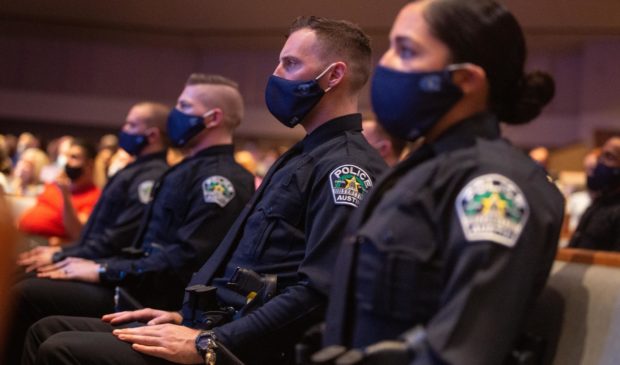Austin will start training new police again this June, after a yearlong hiatus
Friday, May 7, 2021 by
Audrey McGlinchy, KUT City Council members voted Thursday to restart cadet classes after a pause to allow the police department to make changes to how it trains new officers.
The next cadet class is set to start by June 7. It will be run as a pilot, so the department can test the changes it made, which include 30 additional hours of training for officers on community engagement.
Council members emphasized Thursday that their vote to resume training is conditional. They maintain the right to pause classes again if they feel the changes they wanted haven’t been made.
“A lot of work has gone into where we are today,” Council Member Alison Alter said before voting. “We are authorizing a pilot. We are not authorizing cadet classes for perpetuity if the reforms are not seriously implemented.”
“This is, in some sense for me, a leap of faith,” she said.
The vote was 9-1-1, with Council Member Greg Casar voting against and Mayor Pro Tem Natasha Harper-Madison abstaining. Both said they felt the city was greenlighting the restart too quickly.
“This is a trial phase only,” Harper-Madison said before the vote. “However, I am deeply concerned that we may be compromising that trial phase by starting it too soon.”
The 144th class of the Austin Police Academy was originally supposed to convene last June with 100 cadets; it will resume this summer with up to 92 cadets, at a cost of roughly $2.2 million to the city. When it begins in several weeks it will be run differently and be under more scrutiny than past classes, the city says.
One of the overarching criticisms of the academy was that it functioned as a “military-style academy,” creating officers who thought of themselves more as warriors than as guardians of the public.
Austin’s interim Police Chief Joseph Chacon told Council members Thursday he was committed to changing this.
“The type of training that we might see in a military academy, which is much more strict and ‘lecture and listen’ type, we are moving (away) from that direction,” he said. But Chacon added it was necessary to put cadets in unnerving role plays so they could be prepared for encounters they might have on the job.
“We do need to continue to create scenarios that place our cadets under stress,” he said. “They will be exposed to stressful situations in their careers out on the streets, and we need to prepare them for that.”
Council members asked City Manager Spencer Cronk to make changes to police training in December 2019, after the city received anonymous complaints that a former assistant police chief repeatedly used a racist term for Black people and former cadets testified about intimidation and discrimination. (An investigator hired by the city to look into the claims about the former assistant chief could not corroborate the allegations, but noted hearing unrelated anecdotes about a culture of racism and sexism in the department.)
Council asked Cronk to make changes by June 2020 or otherwise postpone cadet classes; he said the pandemic delayed the work, so the city hit pause on the training.
The restructured training academy will be two weeks longer than past courses. Cadets will take a new class titled “The History of Police and Race in America,” which was designed by the Office of Police Oversight and the UT School of Law.
The department has also agreed to get rid of the practice of having cadets carry sandbags when they make a mistake in the academy.
Some of these changes are in response to recommendations from various consultants over the past year. In that time, outside auditors hired by the city published several unfavorable reports about how Austin police are trained and the materials used to educate them. For instance, a panel of community members tasked with watching videos used in training officers said depictions of police interactions rely on racist, sexist and classist stereotypes.
But while the department has made some changes, others are still pending. According to a presentation made to Council members earlier this week, APD still needs to make a dozen changes, including OK’ing a process for how cadet teachers are evaluated. That’s one reason Casar chose not to vote for restarting the cadet classes.
“I wish we had done some of this in the months beforehand so that we could say we got everything done before we start the class,” he said.
Council members say the city will keep a close eye on how the class, officially dubbed the Pilot Reimagined Cadet Training Academy, is going. The city is paying an additional $375,000 to Kroll Associates, one of the outside consultants hired to review how police are trained, to observe and report on the reinstated class.
This story was produced as part of the Austin Monitor’s reporting partnership with KUT.
The Austin Monitor’s work is made possible by donations from the community. Though our reporting covers donors from time to time, we are careful to keep business and editorial efforts separate while maintaining transparency. A complete list of donors is available here, and our code of ethics is explained here.
You're a community leader
And we’re honored you look to us for serious, in-depth news. You know a strong community needs local and dedicated watchdog reporting. We’re here for you and that won’t change. Now will you take the powerful next step and support our nonprofit news organization?






